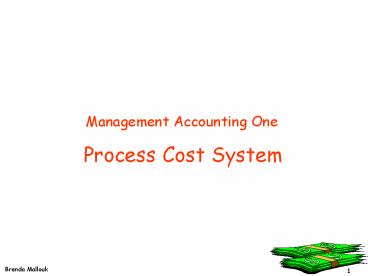Process Cost System
1 / 13
Title:
Process Cost System
Description:
... Abnormal spoilage (unexpected ... All spoilage was discovered at final inspection ... associated with the abnormal spoilage. 13. Brenda Mallouk. Job-order ... – PowerPoint PPT presentation
Number of Views:131
Avg rating:3.0/5.0
Title: Process Cost System
1
Management Accounting One
Process Cost System
2
Product Costing
Type of System
Collecting the Cost
Actual M. L. O/H
Job Cost
Actual M L Predetermined Overhead
Process Cost
Standard M. L. O/H
3
Process Cost System
What Is It?
- Method of accumulating costs by process
or operation
- Products flow sequentially from one
department to the next
- A work in process account is maintained for
each department
4
Flow of Costs For Multiprocessing
Step Four
Step One
Work-in-Process, Layout
Finished Goods Inventory
Transferred to Press Dept.
Direct Material Direct Labour Applied Mfg.
Overhead
Cost of Completed Goods ready for sale
Cost of Goods removed when sold
Step Two
Work-in-Process, Press
Step Five
Transferred-in
Transferred to Welding Dept.
Direct Labour
Cost of Goods Sold
Mfg. Overhead
Cost of Goods which have been sold
Step Three
Work-in-Process, Welding
Cost of goods
Transferred-in
completed and
Direct Material
moved out for sale
Direct Labour
Mfg. Overhead
5
Process Cost Valuation
End of period requirements --
- Value of ending work-in-process inventory
- Value goods transferred to next department
How
- Average Cost
- FIFO
6
Where are the Units?
TO
Next Month
July
A
B
B
Started,Completed C
Last Month
D
E
D
May
This month
June 1
June 30
7
Average Cost
A B C D
Equivalent Production
OR
TO D
8
FIFO Cost
(TO - A) D
Equivalent Production
OR
B C D
From Opening Inventory
Transferred Out
From Current Production
9
Unit Costs
How To Calculate
Average Cost
FIFO Cost
(Inventory Value Cost Added) / EP
(Cost Added) / EP
10
Shrinkage, Evaporation, Spoilage and Waste
Accounting Treatment
Item
Loss from Normal spoilage. (amount
expected) Loss from Abnormal spoilage
(unexpected amount)
- Considered a product cost and and is absorbed
(added) to the cost of the good units produced. - Treated as a period cost and is expensed in the
period in which it occurred.
11
The following activity took place in the final
department during January Work-in-Process,
January 1 1,400 Units transferred in from
Prior Department 14,000 Units spoiled 700 Units
transferred out to Finished Goods 11,200 Addition
al material is added at the beginning of the
process in the final department. The
work-in-process inventory was 70 complete as to
conversion on January 1 and 40 complete as to
conversion on January 31. All spoilage was
discovered at final inspection before the units
were transferred to finished goods. 560 of the
units spoiled were considered normal.
12
The company uses the average cost method. The
equivalent units and the current costs per
equivalent unit of production for each cost
factor are as follows
Equivalent Units
Current Costs/
Equivalent Unit Cost of prior departments 15,400
5.00 Raw materials 15,400 1.00 Conversion
cost 13,300 3.00 9.00
Calculate a. The cost of production transferred
to finished goods inventory. b. The cost
assigned to work-in-process inventory on on
January 31. c. The cost associated with
the abnormal spoilage.
13
Comparison of Job-Order Costing and Process
Costing
- Process costing
- Costs accumulated by department or process.
- Work in process has a production report for each
batch of products. - Homogeneous products.
- Units continuously produced for inventory.
- Job-order costing
- Costs accumulated by the job.
- Work in process has a job-cost sheet for each
job. - Heterogeneous products
- Jobs built to customer order.





![[Dental Implants Cost] PowerPoint PPT Presentation](https://s3.amazonaws.com/images.powershow.com/3840011.th0.jpg?_=201909240612)

























